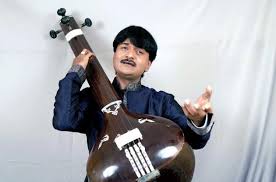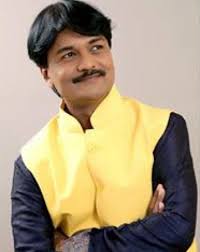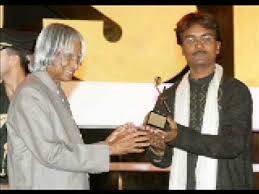“Listen Extensively to the Music of the Masters!†– Precious advice from Hindustani vocalist Pandit Jayateerth Mevundi
Pandit Jayateerth Mevundi, groomed in Hindustani classical vocal music by able teachers in Karnataka’s Dharwad-Hubli region, is recognized as a powerful and versatile vocalist who can render khyaal, thumri, abhang and bhajan with equal ease. A torch-bearer of the Kirana gharana, Pandit Mevundi is currently on a US tour and will make a stop in Boston in the last week of August, 2016. He will present a classical vocal music program for Shadaj with Anil Khare on tabla and Narendra Nayakat on harmonium at the First Parish Church, 349 Boston Post Rd, Weston, MA on the evening of Saturday, Aug 27, a devotional music program on Sunday, Aug 28 at St’ Mary’s Episcopal Church, 75 Cold Spring Road, Westford, and two workshops at 39 Independence Ln, Ashland, MA on Monday, Aug 29 on the topic of “Difference between riyaz and performance†and on Tuesday evening, Aug 30 on “Taan developmentâ€.
Winner of several awards including the prestigious Pune based “Pula Deshpande†award for Classical Music, Jayateerth Mevundi shares his views on the music of Kirana gharana and offers advice to younger generation wanting to pursue classical music in a serious manner.
Please tell us about your connection with Hindustani music in your early years of life?
I was born in Hubli, Karnataka. My mother Sudhabai was interested in Hindustani Classical music and used to sing Purandara Dasa kritis. As a child, I used to attend music programs in Kundgol, the birthplace of Sawai Gandharva with my parents and listen to great artists like Smt. Gangubai Hangal. I was very influenced by Pandit Bhimsen Joshi’s singing – his (swar lagaav) manner of singing musical notes and his taans. I started lessons with a local teacher in Hubli and moved on to receiving formal vocal lessons in Hindustani classical music from Pandit Arjunsa Nakod at the age of fourteen. Later I learned from Shripati Padegar, a disciple of Pandit Bhimsen Joshi for many years.
Your teachers follow singing style of Kirana Gharana. How would you describe music of this gharana(school)?
Kairana is a village located near Delhi and was the seat of what came to be known as Kirana Gharana. Ustad Abdul Karim Khan Sahib and his cousin Ustad Wahid Khan Sahib were the main people who made the music of the Kirana Gharana popular. Ustad Abdul Karim Khan moved to South India and spent time in Mysore where he observed and even learned some Karnatic music. His singing style reflected “bhakti†(devotion). Ornamentations such as khatkas and murkis became specialized. His singing of musical notes (swar lagaav), careful resting on each note and delineation of raga became an inspiration for music students such as Roshnara Begum, Hirabai Barodekar, Saraswati Rane. Sawai Gandharva, guru of late Pandit Bhimsen Joshi became his main disciple. The legendary late Ustad Amir Khan Saheb was also influenced by of Kirana Gharana , particularly, the singing style of Ustad Wahid Khan.
With the passage of time, do you feel the Kirana Gharana style changed and morphed into something other than its original character?
Over time, change is bound to happen with any art form. Pandit Bhimsen Joshi brought in influences of Jaipur and Agra gharanas into the kirana style of singing – you can hear Kesarbai Kerkar’s influence in his taans. He was influenced by Bade Ghulam Ali Khan’s music, by Siddheshwari Devi when it came to singing thumris, and by Bal Gandharva when it came to singing Natya Sangeet. My teachers taught me that it is perfectly OK to add in good aspects of any other gharana’s music into your own music. Changes are for the betterment of music.
How have YOU contributed to Kirana Gharana’s style of singing?
I have put thought into “taan†aspect of khyaal form of music. I make different patterns of taans that borrow ideas from rhythmic cycles and I like singing taans that span all 3 octaves of vocal music.
Can you recall and share any special incident related to music in your life?
I was 25 years old and working for Akashvani (All India Radio) in Goa when I received a phone call from late Pandit Bhimsen Joshi inviting me to sing for annual Sawai Gandharva festival in Pune. He tuned the taanpura for my performance and blessed me. He invited me after 16 years to sing again at the same festival. He had faith that I would do something worthwhile in music in my lifetime. His blessings meant a lot to me.
What advice do you have for the younger generation who want to become professionals in classical music?
I suggest that they listen extensively to great masters, to spend time practicing music doing sadhana and riyaaz, not to get too commercial about their music and to give their best in every performance whether they are paid little or a lot of money. Finding sponsors for classical music is becoming increasingly difficult and there is a lot of politics when it comes to choice of artists. There is financial risk if one goes for career in classical music but things will work out eventually if one comes to the world with good fortune and blessings of elders. One has to have faith in GOD and the blessings of parents, Gurus as well as well-wishers.


